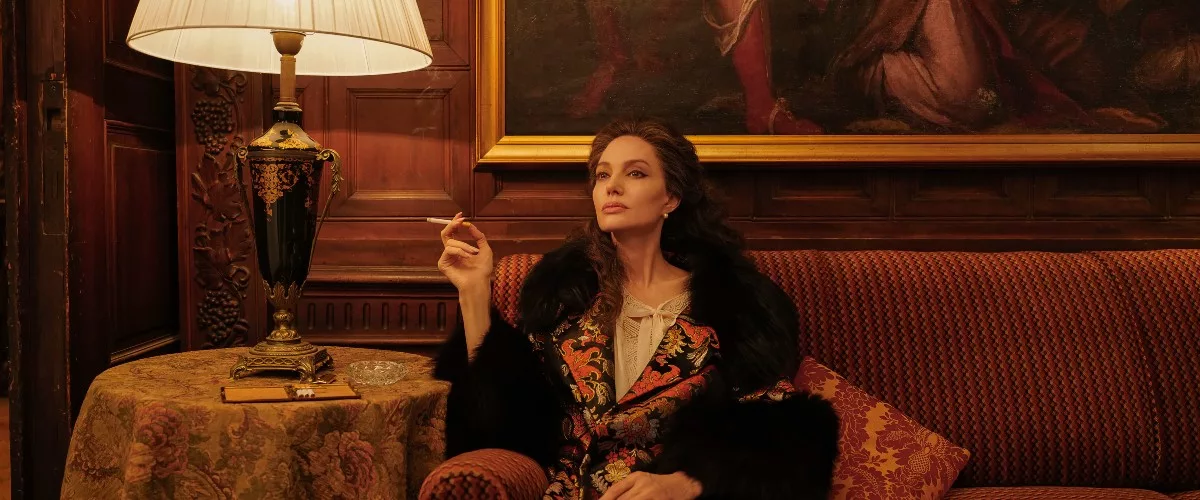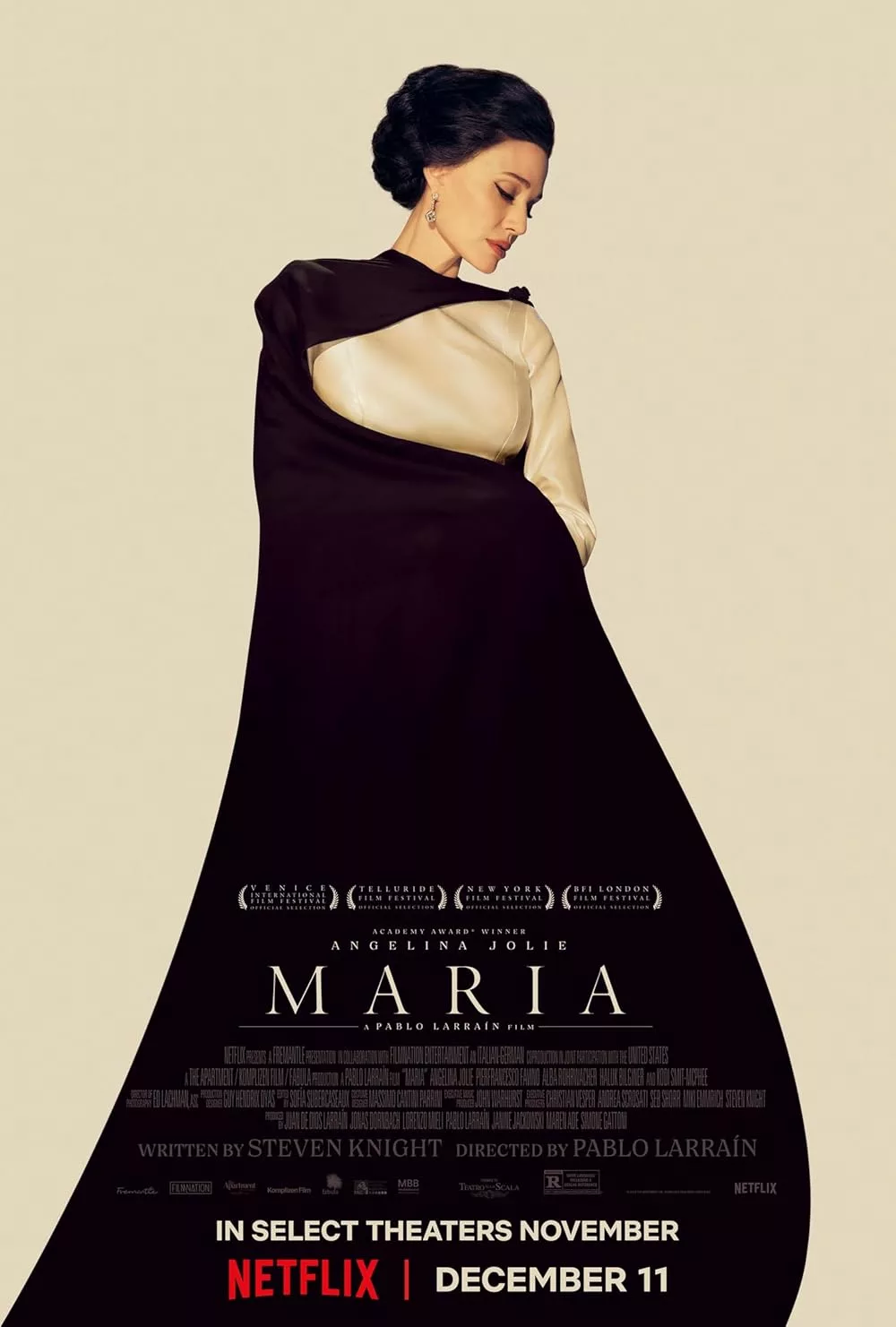Even if he doesn’t exactly go there in his cinema, Pablo Larraín often obliquely flirts with horror. The hints were there in the fanatical nature of the titular “Tony Manero” character, a dancer unnervingly obsessed with John Travolta in “Saturday Night Fever.” And they were all the more obvious in his gorgeous political satire “El Conde”—one of 2023’s boldest cinematic outings that imagined Pinochet as a 250-year-old vampire. To the careful eye, the director’s genre exploits elevated much of his ingenious, gradually heartbreaking psychodramas “Jackie” and “Spencer,” too, his pair of otherworldly films on the troubled lives of legendary 20th century women.
Now with “Maria,” about the final days of the iconic American-Greek soprano Maria Callas, Larraín turns his “historic women” movies into a near-perfect trilogy, giving us a stunning conclusion to his series. Upon seeing “Maria” for the first time months ago at the Telluride Film Festival (and revisiting it several times thereafter), this critic pondered what made “Maria” not only the gentlest, but the best of the three. And the answer was perhaps always obvious—as an opera connoisseur, Larraín is proudly (and often, sentimentally) protective of one of the artform’s most groundbreaking singers throughout “Maria,” a feature that was prominent neither in “Jackie,” nor “Spencer.”
It’s not that the psycho-dramatic dreads we feel in those former two films aren’t a part of “Maria.” For everyone who’s ever feared losing a big part of what defines them, and for everyone who’s opened their hearts to something they love so widely and unrestrictedly, only to see various forms of cruelty sneak in, this generous and beautiful picture ought to be a gut-punch. But you can often sense that Larraín, among the most intuitive filmmakers working today, almost wants to shield Callas from the harmful grip of those cruelties. While her end is inevitable in the film—Callas died in 1977 at the young age of 53—you will be disarmed, even moved to tears, experiencing Larraín’s care for her in “Maria,” which is essentially a compassionate ghost story on the beloved things we lose, as they continue to deteriorate and slip through our fingers against our will.
In a queenly performance of poise and mystique, Angelina Jolie plays Callas with an ethereal presence, grasping the intense grief of the once-in-a-generation singer who’s been losing her voice. In the beginning, Jolie—through Ed Lachman’s glorious, high-contrast black-and-white lensing—looks straight at the camera, as her defiant Callas sings “Ave Maria” from Verdi’s Otello, perhaps both as a little prayer to her past, and as a reckoning with her present. The voice we hear (both in this scene, and in the several arias we’d get to hear later on) belongs to Callas for sure. (At least for the most past, as Larraín reportedly has mixed in drips of Jolie’s voice in there, too.) But that doesn’t mean Jolie isn’t doing her own singing—she is, as evidenced in the way that she stretches her facial muscles and engages her entire body in the process. But she is subtle in those signifiers, as one has to be while embodying Callas. The famed soprano was effortless in navigating her range and hitting some impossibly high notes—music simply and silkily poured out of her, an artistic flair stylishly internalized and portrayed by Jolie.
A perceptive performer who can sometimes be a tad cold-to-the-touch, Jolie gives her career-best performance as she steers Callas’s ups and downs during the singer’s final days, almost all of it empathetically imagined by Larraín and screenwriter Steven Knight. She floats around her grand Paris apartment, an elegant and expansive space of gothic hues that envelopes Callas in a cocoon of claustrophobia. (Production Designer Guy Hendrix Dyas miraculously marries realism with wistfulness in his work.) She seeks the acceptance of her devoted staff, particularly Bruna (Alba Rohrwacher) and Ferruccio (Pierfrancesco Favino), who bring much warmth and humor into the movie. She turns inward and has conversations with her own self when on a cocktail of medications—chiefly, Mandrax, inventively personified by Kodi Smit-McPhee. Elsewhere, she fends off nosy press and entitled fans. Meanwhile, she remembers both the glamor and the pain that she felt through a thunderous, rewarding, and sometimes heartbreaking past, one that eventually launched her into a rocky romance with the Greek-Argentine tycoon Aristotle Onassis (the terrific Turkish actor Haluk Bilginer). And she does all that sporting Massimo Cantini Parrini’s breathtaking costumes, both exact replicas of her known pieces, and custom designs made for the movie.
In honoring her journey, Larraín contrasts the film’s Paris scenes of gorgeous colors and locales with Maria’s black-and-white remembrances—not only trying to get to know La Callas but also hoping to infuse anyone who might be watching with the kind of affection he clearly feels for the diva. Dare to open your heart to his quest, and you might just feel that tenderness in a deep sense, even if you aren’t an opera connoisseur. And that’s perhaps the grandest miracle of this film—like Callas herself aimed to do, “Maria” brings opera to the masses, not as a gimmick or high-minded endeavor, but as an act of generosity and understanding that art belongs to everyone who wants to appreciate it. In that, as Larraín purposely and studiously braids in arias into his narrative—full songs for the most part, and not frustratingly chopped up snippets—and gives you a taste of everything from Bellini to Puccini to Donizetti, you’ll feel like you’ve had a full musical meal, with a hunger for a second helping.
Will you get to know Callas by the end of “Maria”? Or will she remain as a complete mystery? Rest assured that’s hardly the point of Larraín’s cinematic ode. The reward is the beautiful and heart-swelling two hours you’ll have the privilege of spending with La Callas, alongside a director who wants nothing more than to share his immense love for her.
In theaters now, on Netflix December 11th.




















